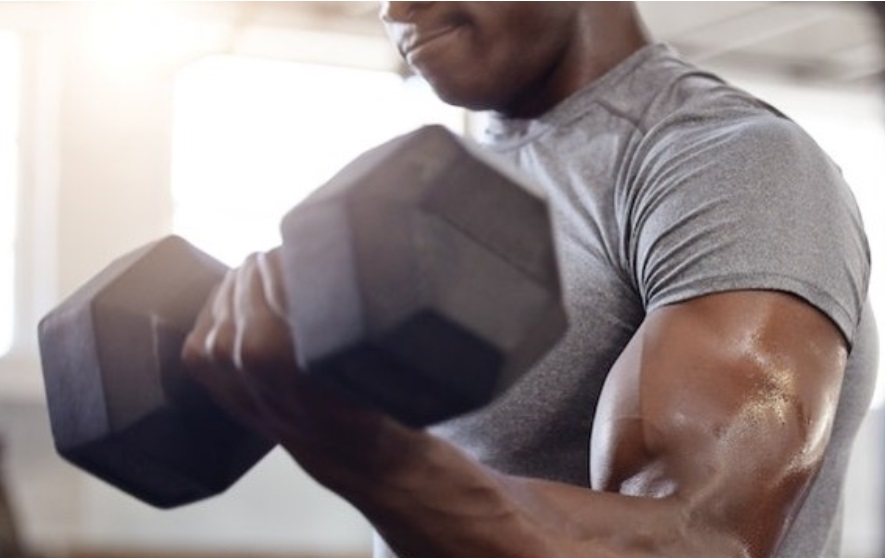Exercise Is Vital to Men’s Mental and Sexual Wellbeing: Lessons for Africans
By Adebowale Bello. B.Tech Microbiology, Freelance Health Writer. Medically reviewed by the DLHA team.
November 6, 2025

Partial view of a black male performing weight training for muscle building and strength
Many men believe exercise is mostly about building muscle or losing weight but recent research shows it does much more. As a man, exercise affects how you feel, think and even your sexual performance. Yet, despite knowing these benefits, many men still do not make time for regular physical activity.
A new survey from the Cleveland Clinic sheds light on this problem, revealing how men see the link between exercise, mental health and sexual wellbeing. It highlights how lifestyle choices can quietly shape your physical appearance and the overall quality of your life.
The survey was conducted in Florida, United States among 445 men aged 18 and above. The goal was to understand how men view the relationship between exercise and their health, especially mental and sexual wellbeing. The survey was done online between June 3-5, 2025, and the results were carefully adjusted to represent men across Florida. It was part of an ongoing campaign to encourage men to talk more openly about their health and take it seriously.
Even though most men said exercise positively affects their mental health, self-confidence and sex drive, nearly one in three admitted they do not exercise regularly.
Here are some key takeaways from the survey:
Interestingly, two-thirds of the men said they had sought or would consider seeking support from a mental health professional. This shows a growing openness about mental health among men, even in places where it was once considered a taboo topic.
While the research was conducted in the United States, it raises important questions for men in Africa. Many African men rarely go for medical checkups unless they are seriously ill. Exercise is often viewed as something for athletes, gym enthusiasts or people trying to lose weight, not as a daily necessity for good health.
Related: Why African Men Need Regular Health Checks, Screenings and How much gym work is enough?
There is a steady and rising rate of diabetes, high blood pressure and heart disease affecting men across the continent and sadly, these conditions often go unnoticed until they lead to something serious, like a stroke or heart attack.
Sexual health is also a sensitive topic in African societies. Many men are embarrassed to talk about it and even fewer seek help when they notice problems. However, as the survey showed, sexual health can be a warning sign for deeper medical issues. For example, erectile dysfunction can be an early symptom of poor blood circulation or heart disease.
Physical activity also plays a key role in preventing these health issues as exercise improves blood flow, balances hormones, strengthens the heart and boosts mental health. It also helps with confidence and self-image, which are vital for a man’s overall wellbeing.
If men know the benefits, why do many still avoid exercise?
Some reasons include a lack of time, work stress, fatigue or lack of motivation. For some, exercise feels like a luxury rather than a need. Physical activity does not have to mean expensive gym memberships or long hours of training. Brisk walking, cycling, dancing, playing football with friends or even using the stairs regularly can make a big difference. What matters most is your consistency.
Related: 10 reasons Africans should exercise
Health is not only the absence of disease, it’s about how you feel, think and live daily. For African men, this means paying more attention to small lifestyle habits like eating well, sleeping enough, managing stress and staying active. Communities, workplaces and families can also play a role by creating spaces that encourage open conversations about men’s health. When men are encouraged to talk, they are more likely to seek help and make healthier choices.
Wrap Up
Men understand that exercise benefits their body, mind and sex life, yet many still neglect it either because of their busy lifestyles or cultural attitudes. Exercise should not be seen as a chore or a luxury but as an investment in a man’s future — one that pays off through better mood, stronger relationships and longer life.
Your health begins with movement and that first step could be as simple as lacing up your shoes and deciding not to skip another day to exercise.
Source: Cleveland Clinic Newsroom
Published: November 6, 2025
© 2025. Datelinehealth Africa Inc. All rights reserved.
Permission is given to copy, use and share content for non-commercial purposes without alteration or modification and subject to attribution as to source.
DATELINEHEALTH AFRICA INC., is a digital publisher for informational and educational purposes and does not offer personal medical care and advice. If you have a medical problem needing routine or emergency attention, call your doctor or local emergency services immediately, or visit the nearest emergency room or the nearest hospital. You should consult your professional healthcare provider before starting any nutrition, diet, exercise, fitness, medical or wellness program mentioned or referenced in the DatelinehealthAfrica website. Click here for more disclaimer notice.